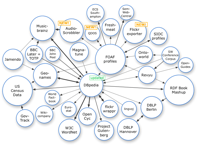Why kill Google?


Whatever the reason, 'Google Killers' crop up with depressing regularity, even if (allegedly) you need to put words in the mouths of your commentators to find one.
I spoke with Powerset CTO Barney Pell last night, and one of the topics we explored was his company's billing last year as a 'Google Killer.' More on that conversation in a later post, because for now I want to turn to a related item from overnight; Tim Berners-Lee's latest post to his low-volume blog.
Tim talks about the attention that one of his recent flurry of press interviews has attracted. In this case, he was talking to British broadsheet, The Times, and notes of the article;
"the Times online mis-states that I think 'Google could be superseded'. Sigh. In an otherwise useful discussion largely about what the Semantic Web is and how it will affect people, a misunderstanding which ended up being the title of the blog."
He continues,
"The Semantic Web will not supersede the current Web. They will coexist. The techniques for searching and surfing the different aspects will be different but will connect. Text search engines [like Google] don't have to go out of fashion." (my emphasis)
Noting the speed with which news stories such as that from The Times spread into the blogosphere, Tim comments on the difficulty that he is experiencing in getting the paper to correct its misrepresentation of his words and uses this as a trail into a wider consideration of data re-use online.
This (the ability to combine, recombine, use, reuse, link, link, and link again), he would appear to suggest, is the Semantic Web's (forgive my slip into the language of violence) 'Killer App.'
"The benefit of the Semantic Web is that data may be re-used in ways unexpected by the original publisher. That is the value added. So when a Semantic Web start-up either feeds data to others who reuse it in interesting ways, or itself uses data produced by others, then we start to see the value of each bit increased through the network effect."
Bravo. I couldn't agree more.
I must also admit, though, to being surprised at the extent to which too many 'Semantic Web' companies appear not to get this. Too many of those I speak with are proudly, happily, and expensively building yet another data silo. Semantics may run through their applications, and World Wide Web Consortium (W3C) specifications may even get a mention. But the essential primacy of linkable reuse outside the carefully managed boundaries of their application is greeted - at best - with carefully spun hedgeing and - at worst - with outright horror. "Why would some poor misguided user want to do anything outside the Nirvana that my application gives them? Are you mad?"
Tim gives due credit to the great work going on in the Linked Open Data project, and trails the associated workshop (at which I'll be speaking, along with several of my Talis colleagues) at the Web Conference in Beijing next month.
I, for one, want to see more of the commercial Semantic Web startups embracing a lot more of those ideas. Linked Open Data as a university research project is one thing. Linked Open Data at the heart of a business model is something else entirely, and it appears to be something that either the investors or the startups are not yet taking seriously enough. This is the promise of the Semantic Web; Linking. If the Semantic Web only results in yet another generation of silos then what's the point? It's probably easier to build a silo using mySQL and some PHP. The investment in enhancing the linkability, the citeability, of a data resource can only be realised once third parties can link, and can cite.
Rant over, for now. But I really do want to hear from those who get it. And, like Tim;
"So in scanning new Semantic Web news, I'll be looking out for re-use of data. The momentum around Linked Open Data is great and exciting -- let us also make sure we make good use of the data."